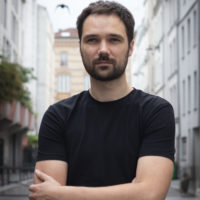Distinguished
Reporting
Award
The Poet’s Army
A Buddhist monastery emerges from the darkness of the night. “We’re stopping here,” orders commander Maung Saungkha, his eyes bulging with fatigue. The 4x4s switch off their headlights, as the light could give them away. The Burmese air force is on the prowl. The exhausted convoy spits out its passengers, soldiers from the Bamar People’s Liberation Army (BPLA), coated in sweat and dust. These kids, barely 20, wearing helmets and carrying assault rifles, burn their boredom away with flimsy cigarettes. Maung Saungkha, 31, the poet they blindly follow, unhooks a Glock pistol from his belt. His men have stretched his hammock between two wooden pillars. The war chief, a small man with dark, mischievous eyes, wraps his belly with a black sheet and rocks from side to side, humming a Burmese pop tune.
The commander has stopped in a small town in eastern Burma, in the north of Karen State, a province the size of Belgium where fighting against the junta is a daily occurrence. A month ago, in March 2024, the biggest town in the area, Hpapun, was conquered by Maung Saungkha’s troops and his Karen guerrilla allies, who are now seeking to seize neighbouring bases. At first, the battle seemed lost: on one side, the insurgents — “terrorists” according to Burmese authorities — holed up in the jungle with no experience of warfare; on the other, a state army, equipped with fighter planes and supported by Russia and China. But the tide has turned. Hpapun and dozens of towns have fallen into the hands of the resistance, which claims to control more than half of Burma’s territory. In revenge, the junta is bombing civilians suspected of supporting the armed groups. A month earlier, it destroyed a monastery housing refugees. The attack left eight people dead and around fifteen injured. “Don’t worry, nothing will happen,” Maung Saungkha tells me. Suddenly I hear him snore. When I wake up, the dawn is grey and sticky. The night has been interrupted by the muffled sounds of drone strikes ten kilometres away. The commander rejoices in the morning: “Those were our bombs! Their last bases won’t last long.”
He had never carried a gun
I find it hard to recognise the staunch pacifist who has taken part in all the anti-conflict demonstrations and whom I have interviewed several times. Three years earlier, Maung Saungkha didn’t give a damn about drones or military strategies. He had never carried a gun. He was a poet with an immense aura, in a country where the art of shaping rhymes makes the powerful tremble. Poetry has long played a political role in Burma, at least since the struggle for independence at the end of the 19th century, when pamphlets against the British colonists were passed around in secret. Maung Saungkha is the author of several collections — the most famous of which, Hidden Hurts, was written in prison (none of his works have been translated into French). The Burmese love his unbridled style, which mixes politics, art, Van Gogh, and Cat Power with potty jokes and sex stories.
No one in this world is exempt from hurts
I want to piss at hurts
The thing is
my piss always misses its target
These days, the poet is running dry. He hardly writes at all. “I’m too busy, mentally and physically. I don’t even have time to watch a film on Netflix,” he sighs while squeezing a lime. This anti-stress ball ends up in hot water to lower his high blood pressure, which worries him. His sense of humour has waned. His laughter, a childish chuckle, is seldom heard. He says he sleeps too little. Sadness bites, weariness too, but his men don’t know anything about that: “I’m their leader. I keep myself in check.” It’s already been three years since the war swallowed him up.
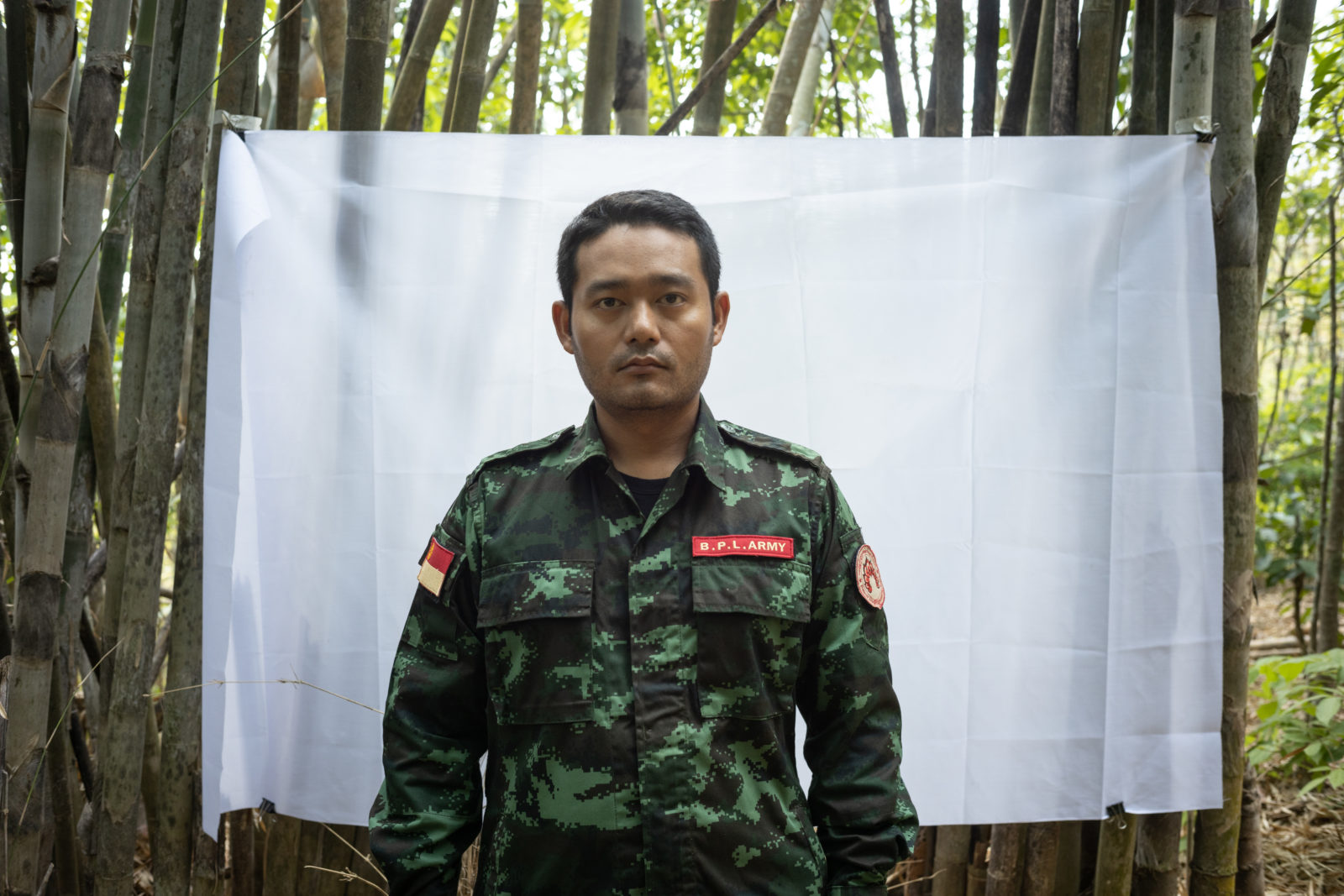
The Bamar People’s Liberation Army (B.P.L.A.)’s commander-in-chief, Maung Saungkha, poses for the photograph in his basecamp in Kayin state, Myanmar. Photo: Ta Mwe
His life and Burma’s destiny came together on the night of 1 February 2021, when the army overthrew Aung San Suu Kyi’s government. A former dissident and Nobel Peace Prize winner, the State Councillor — her official title — was thrown into prison along with dozens of politicians, activists and artists. General Min Aung Hlaing’s coup put an end to ten years of transition to democracy, during which the Burmese population, estimated at 54 million, had seen free elections, an end to censorship and an opening up of the economy. Everywhere, hundreds of thousands of demonstrators demanded the departure of the military, but their peaceful processions were dispersed with live ammunition. A brutal return to dictatorship.
To continue the struggle, many young people joined the ethnic minorities who, in the border regions, had been fighting the central government for over half a century. These communities took in those who had fled and trained them to fight the junta, which had become their common enemy. Maung Saungkha found refuge with the soldiers of the Karen National Liberation Army (KNLA), the oldest guerrilla group in the world, which emerged in the country’s east in 1948, shortly after independence. With their support, the poet created his own group, the Bamar People’s Liberation Army (BPLA), inspired by his role models, Mao Zedong and Che Guevara. In combat, his troops act as reinforcements for the KNLA, never acting alone. “We’re a bit like the KNLA’s baby,” laughs the thirty-year-old.
Appreciated by the Bamar majority — Saungkha’s ethnicity, representing two-thirds of the Burmese population — as well as by the ethnic minorities, he is one of the rare figures capable of uniting these two worlds, which have been torn apart since the country was founded. “Our success is not measured by the number of outposts we take or the number of junta soldiers we kill, but by our ability to build trust,” stresses the influential commander. He is fighting to establish a federal and democratic state, free from the grip of the military. A new Burma, he claims.
To reach his camp — the location of which is kept secret — one has to cross the border into Thailand, travel up the muddy waters of the Salouen River and land in the west, in Karen State, then cross rivers and pass through hamlets emptied by the war, standing on the hills like so many graves, carefully skirting the positions of the Burmese army. Perched on a pick-up truck, looking cool behind his Ray-Bans, Maung Saungkha acts as a tour guide, handing out new caps and energy drinks that taste like cough syrup. “I’ll show you everything,” he had promised in a message sent a few months earlier.
A bamboo table as HQ
After spending the night at the monastery, the road disappears into a dreadful valley, filled with collapsed hillsides, mounds of stone, and gaping holes. The ground looks as if it has been ploughed by the hands of an angry giant. In reality, it’s the voracious appetite of the gold diggers. When the convoy passes, the miners barely raise their heads. The feast goes on: this war has nothing to do with them. At their feet flows a river full of mercury or arsenic. The trickle of poisoned water has the colours of the rainbow. The poet’s camp has sprung up nearby, on abandoned rice fields. A Karen guerrilla loan. During the monsoon, the mist hides the huts and their earthen bunkers under its fluffy mantle.
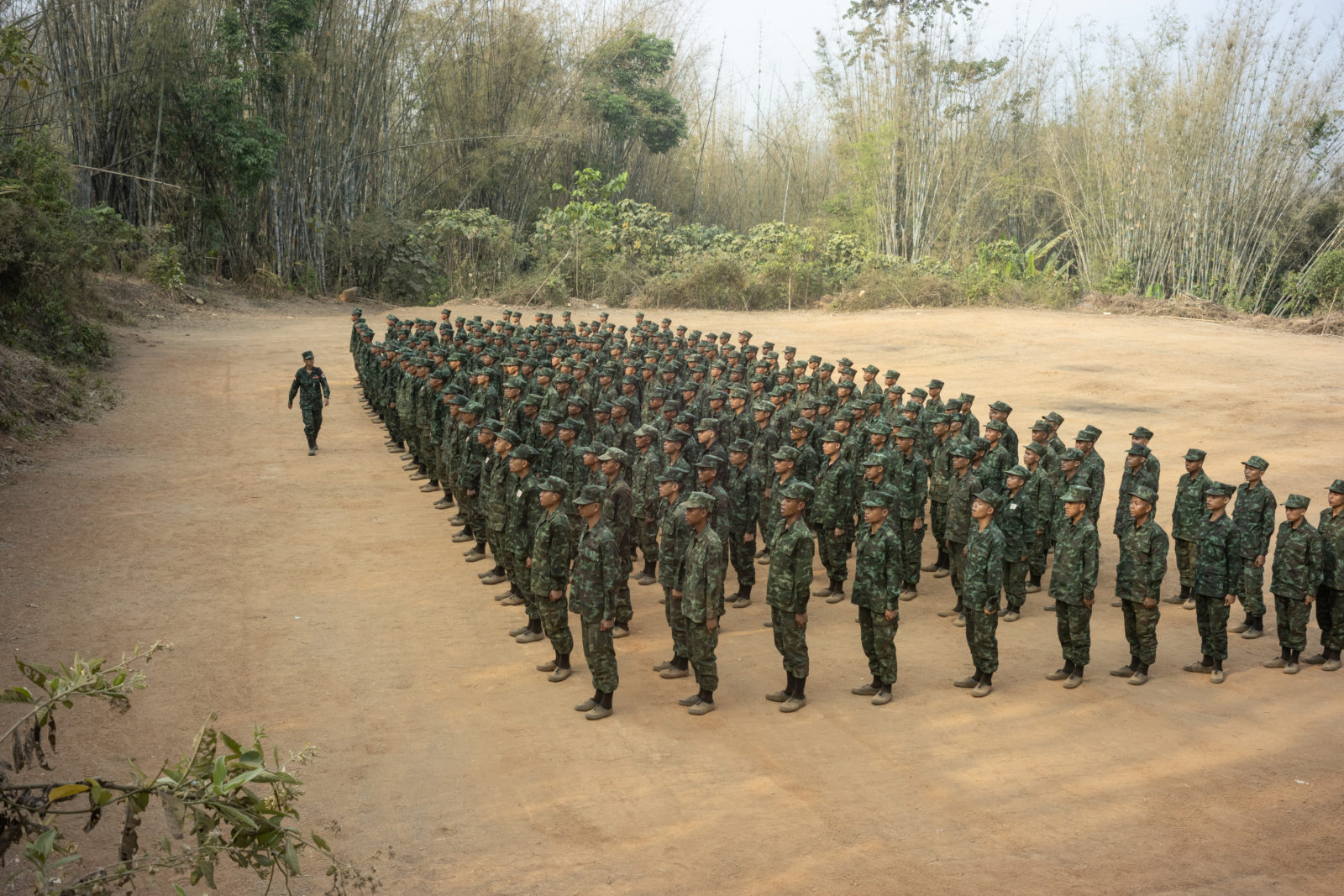
Newly recruited soldiers assemble for morning training at the B.P.L.A.’s secret training ground in Kayin State. Most of the youths who joined this latest batch are those who fled from the Myanmar military’s forced conscription, which was legalized in February 2024. Photo: Ta Mwe
The headquarters where the commander spends most of his days, bent over his Dell computer, consists of a bamboo table covered in oilcloth. Behind him is a whiteboard with a timetable and some of his maxims. This week it reads: “If you do what you believe in, there’s no point blaming those who don’t take part.” His eyes shining with pride, he shows me what he brought back from Hpapun after the military rout. Radio batteries and a frequency jammer. Five school notebooks scribbled in pen, “with their entire strategy.” The centrepiece: a Burmese intelligence notebook, which he lets me leaf through. It contains the names of the junta’s spies, their faces and even their e-mail addresses. The poet regains his thunderous laugh: “You really must be an old fart to print something like that!” He can rejoice. Maung Saungkha is no stranger to military success in Karen State, but also further north, in Shan State. The strategist has managed to place some of his troops alongside a powerful alliance of armed groups. On 27 October 2023, their joint offensive, dubbed “Operation 1027,” along the Chinese border, drove the junta out of the region and tipped the conflict in favour of the resistance.
A stranger in the hills
The poet’s army is said to number around a thousand soldiers, making it one of the largest groups to emerge after the coup. Most of them are young city-dwellers who have left their cosy beds and families for malaria, scorpions and jungle life. They are anything but warriors: students of Russian or Korean, rappers, engineers, designers, a tattoo artist… Other poets too. Lynn Htike, 23, met Maung Saungkha at a literary festival. “I liked his poems,” says this shy soldier, whose leg was wounded by a mortar round. But, more than his poetry, it was the leader’s political plan that convinced him: to finally found an armed group for the Bamar, the majority Buddhist ethnic group. The aim was not so much to defend their rights — they had monopolised power for decades — as to free them too from the grip of the military. The junta recruits its cadres from among the Bamar and, in the name of a supposed superiority of this ethnic group over the others, massacres, rapes and pillages minorities. “It’s our responsibility to eradicate this despicable system,” Maung Saungkha pledges. “We can’t let other ethnic groups do the work for us.”
The poet knows that he remains a temporary resident, a stranger in the hills. One day, a senior member of the Karen forces said to him: “To become chief of a village, you have to own a house there.” He was stung by the phrase. He could see himself leaving the jungle and conquering a piece of territory in the centre of the country, the stronghold of the Bamar ethnic group. There, between the arms of the Irrawaddy River, the land is flat and as red as blood. Maung Saungkha knows it inside out. He was born there on 5 January 1993.
Living near Bagan, an ancient city with thousands of temples, his parents ran a teahouse for many years. It was an institution where the men, huddled on plastic stools, debate world issues while toasting cheroots, cheap stinky cigars. In the early 1990s, Burma was suffocating under the boot of dictator Than Shwe, a superstitious general. There were no cars and no tar in the countryside, where life depended on the gnarled shoulders of the buffalo. The precious beasts did everything, turning over fields and pulling carts. “No one dared eat beef. It was like eating a member of our family,” remembers Maung Saungkha.
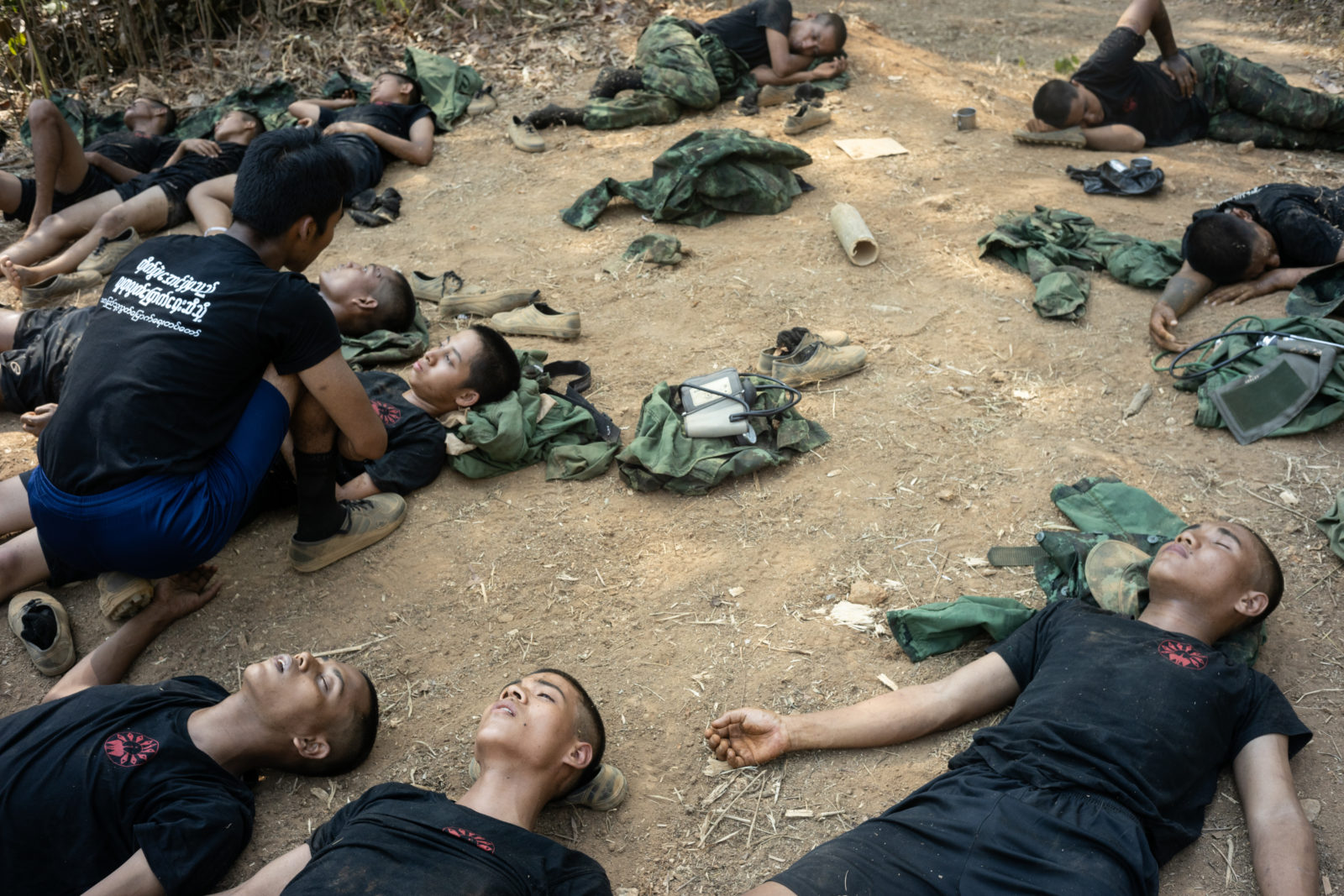
Newly recruited soldiers suffer from heatstroke and faint as temperatures soar to 38°C during the summer in the area. Photo: Ta Mwe
The father had big plans for his four sons, especially the youngest, a bit of a dreamer, who was already publishing poetry in local gazettes. The child was 13 when his family moved to Rangoon — a fallen capital since Than Shwe chose Naypyidaw in 2005, following the advice of an astrologer. But the teeming city remained the beating heart of Burma, a shock for the young country boy, who was studying industrial chemistry at university. Literature had passed him by. In the Burmese education system, only the best students choose their course of study; the others have to make do with the crumbs. The student admired Aung San Suu Kyi, an inflexible rival of the military under house arrest, and was active in the youth wing of her party, the National League for Democracy. In 2012, the dissident, who had been released two years earlier, managed to win a seat in Parliament. Maung Saungkha, on the other hand, found readers on Facebook. On the evening of 8 October 2015, the 22-year-old published a new poem entitled Image.
On my manhood is tattooed
A portrait of Mr President
My beloved discovered it
After our wedding
She was disgusted
Inconsolable
His humour sparked a national storm. A police officer filed a complaint against him on behalf of the scorned president, Thein Sein, former general and successor to Than Shwe, invoking Article 66(d) of the Telecommunications Act. Criticised by human rights activists, this law makes defamation punishable by imprisonment. After a brief escape during which, on Facebook again, the suspect continued his provocations (You can arrest poets / Not poems / Never), Maung Saungkha went on trial. Absurd weeks. No matter how much he denied it, everyone asked him if he really had his penis tattooed. He was sentenced to six months in Insein, the dilapidated Rangoon prison where dissidents are crammed together. “The guards were afraid of us because we could make a mess,” laughs the poet. “I had a great time. I had time to think in my cell. I read 200 books!”
Once outside, the former prisoner founded his association, Athan (“voice” in Burmese), to defend freedom of expression. Wearing an “I love peace” bandana, he organised rallies denouncing the army’s abuses against ethnic minorities. In 2016, after the historic legislative elections, Aung San Suu Kyi finally acceded to the government. But the hope was short-lived. The following year, the former opposition leader defended the military accused of carrying out genocide against the Muslim Rohingya minority. In 2018, she incriminated two Reuters journalists, sentenced to seven years in prison for investigating a massacre committed by the army. By sharing power with the military, the Nobel Peace Prize winner seems to have come to terms with their misdeeds. “She broke my heart,” says the poet, who quit the party in a huff. In 2020, the agitator attracted attention to himself once more by unfurling a banner in the centre of Rangoon to denounce the cutting off of Internet access in a western province where the military was fighting a rebel group, the Arakan Army. This time he avoided prison by paying a fine. The pandemic brought the Burmese economy to its knees. To earn a living, Maung Saungkha set up a campsite and rented tents by the roadside.
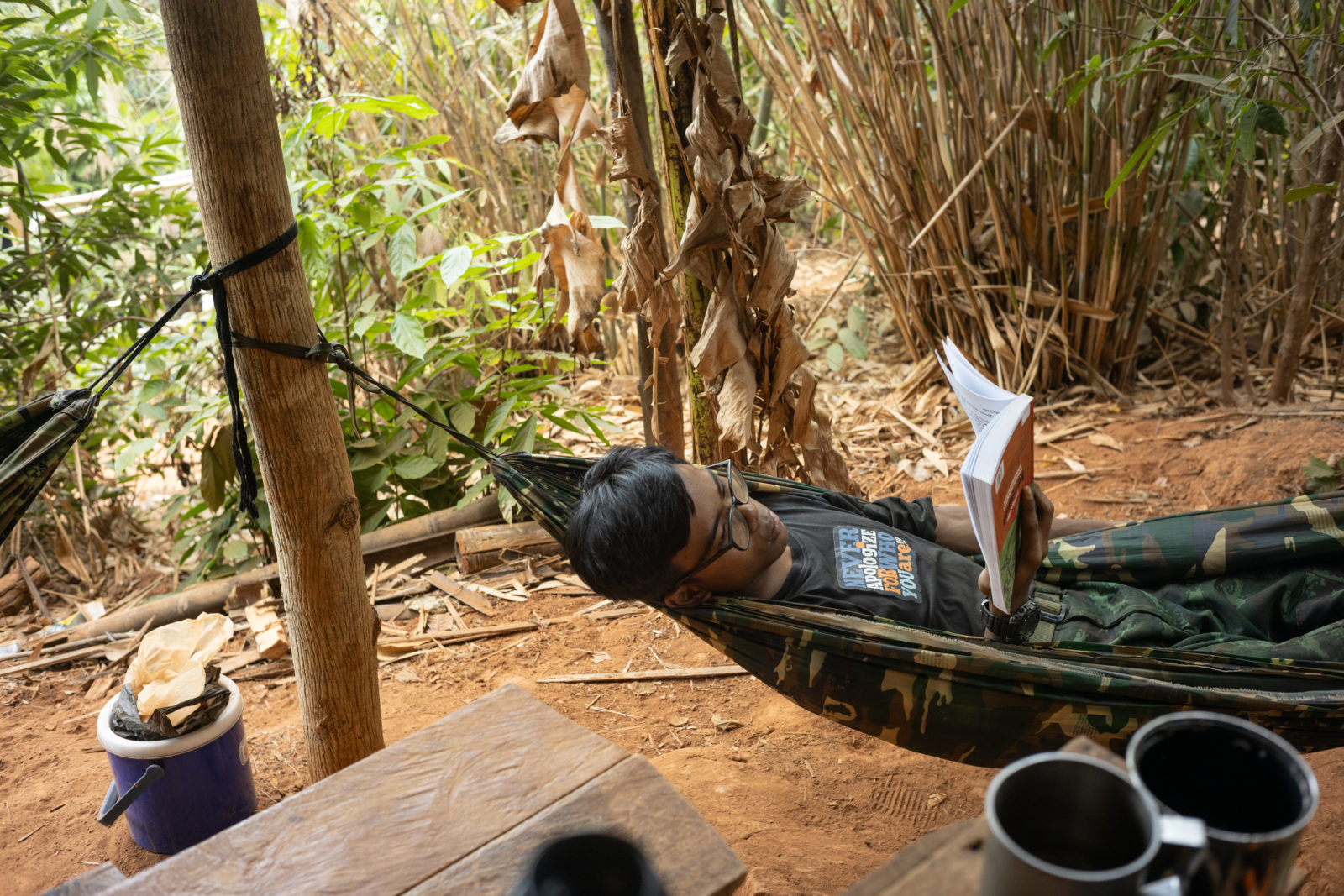
A soldier from the Bamar People’s Liberation Army (B.P.L.A.) rests in the camp as he is off duty. Photo: Ta Mwe
In the early hours of the morning on the day of the coup, two soldiers accompanied by policemen searched the campsite to arrest him, but found only the caretaker. Maung Saungkha had slept at his girlfriend’s place that night: “A stroke of luck. No customers had booked.” A warrant was issued for his arrest, but he reappeared in anti-Junta marches, uncatchable, galvanising the crowd with his loudspeaker. K Za Win, a 39-year-old poet, led the rebellion in Monywa, in the Sagaing region. “He’s my brother,” says Maung Saungkha, who finds it hard to talk about him in the past tense. During a demonstration on 3 March 2021, his friend was shot in the head. One of his poems had captured the military perfectly:
They love their country
Just the way they love to grate a coconut
from inside out,
for coconut milk.That’s who they are.
A video shows two policemen dragging the corpse of K Za Win through the street, scraping the blood-stained asphalt, before throwing it into a van.
That’s who they are.
Five days later, Zaw Myat Lynn, a respected member of the National League for Democracy and headmaster of a school where Maung Saungkha taught, was massacred in prison. His skin melted and so did his tongue. The soldiers poured acid or a boiling liquid into his mouth. The poet saw photos of the deceased: “His face looked like a zombie’s.”
That’s who they are.
The peaceful struggle is a dead end, thinks Maung Saungkha. If I stay, I’ll be next. Some Karen soldiers told him they were ready to welcome him. He came up with an idea, which he shared on Facebook: “Don’t you understand we have to counter-attack? You can draw a hundred swords, but you won’t be able to do anything against such a well-equipped army. If you want to fight guns with guns, contact me.” The message elicited mocking comments. Even his father doubts him. “Dad, I’m not doing this for show,” the son insists over the phone. “I’m going to see it through.”
Negotiating skills
At first, only sixteen people joined him. In their pockets, a few thousand kyats (a handful of euros). A single rifle. But Maung Saungkha’s reputation and negotiating skills did the rest. By talking on Zoom, he managed to convince the Arakan Army to send emissaries to train his team in combat. The rebel group in the west has never forgotten that Maung Saungkha was one of the rare Bamars to plead for their rights, notably in 2020, when their province, deprived of the Internet, was cut off from the world for nineteen months. In April 2021, the poet, unrecognisable, stripped of his long hair and fifteen kilos — since regained — created the Bamar People’s Liberation Army. The first battles were fierce, and the dead were hastily buried where they fell. The survivors persisted. Sai Min, 21, carries water cans across the camp. This amiable, chubby boy has a bad limp, but doesn’t balk at anything. One Thursday in February 2022, in a fit of bravado, he shouted to Maung Saungkha: “I’m going in front of you.” His right leg was blown off by a landmine. His leader, moved, carried him in his arms. “For the first time, I could see his tears,” says Sai Min. “He was crying. He was crying for me.” Sai Min doesn’t want to give his real name. His family doesn’t know he’s disabled; he’s never dared tell them.
At lunchtime, cold plates arrive. Sticky rice, dried fish, cooked and re-cooked, which Maung Saungkha smells “to see if it’s still fresh.” The meals are sparse, the jungle stingy. “Last year, we tried growing cabbage, beans and cucumbers, but it didn’t work out, so we buy tins,” laments Htet Wai Lynn, 23, who looks after three shelves of a bookcase where the chief’s poems sit alongside Homer’s Odyssey and Simone de Beauvoir’s The Second Sex. This wiry man with tattooed arms writes a monthly newsletter that he distributes around the camp. In the evenings, he gives classes on gender equality, federalism and international law. Maung Saungkha likes well-filled heads.
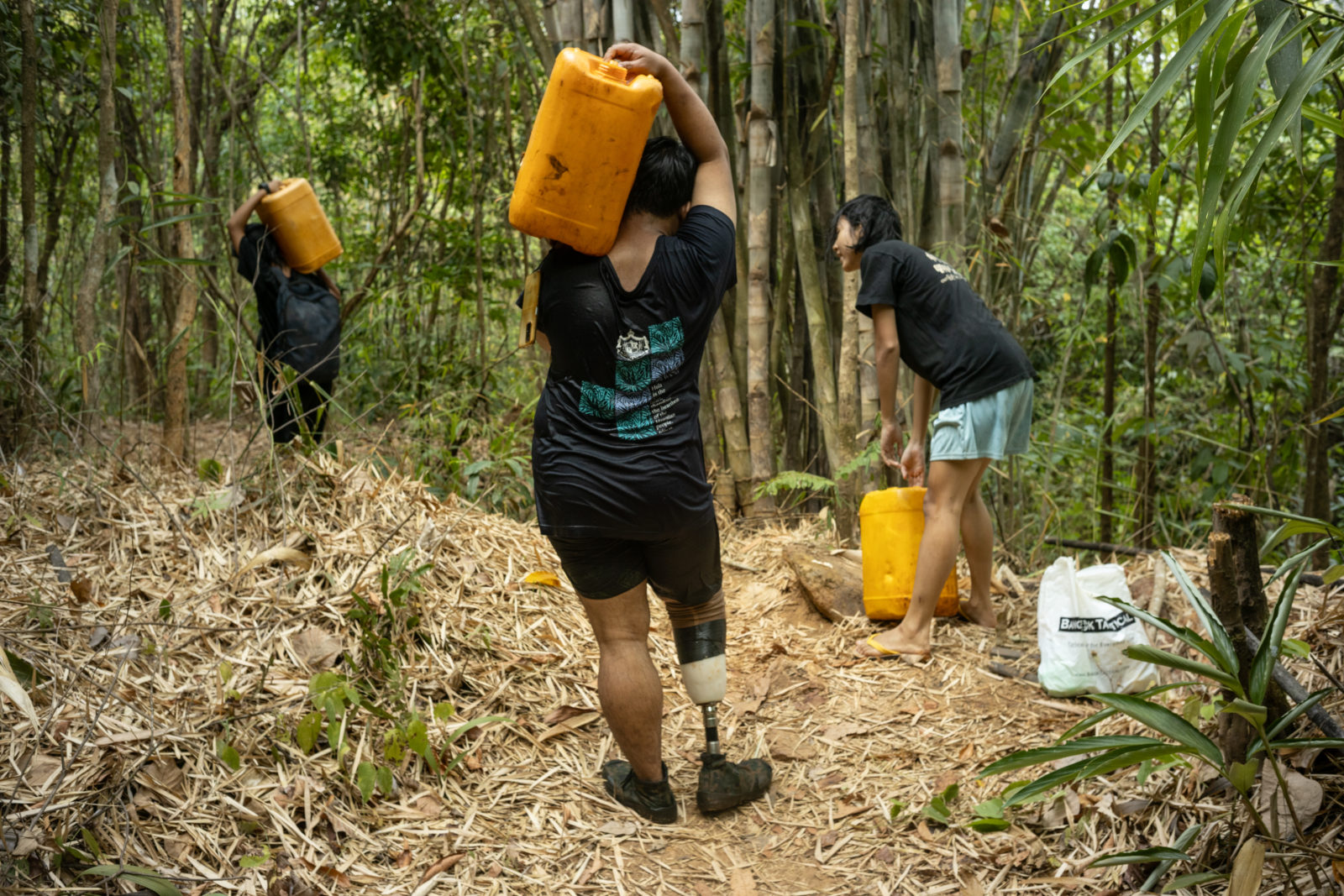
As summer temperatures reach record highs in the area, stream and water shortages become a problem for the rebel forces. Photo: Ta Mwe
In the clearing that serves as the training ground, the latest recruits, tall children with oily skin and shaven heads, stand stiff as daggers. Beaten down by the sun, they grimace and sweat out what remains of their innocence. Since the junta declared military service compulsory in February 2024, future conscripts have been flocking to the poet. More than 2,000 applicants have contacted him. After a drastic selection process, only 250 were chosen, including around twenty women. It was impossible to recruit more: each soldier was a mouth to feed, an arm to arm, and resources are limited. Thanks to donations, mainly from the Burmese diaspora, Maung Saungkha collects 50 million kyats (around €9,000) every month. He also sells t-shirts bearing the BPLA logo, as well as his poetry collections, even though he can no longer get them reprinted. “It’s not enough,” he says. “We’re spending more and more.” Weapons arrive in dribs and drabs from the Shan state. The group has only a few ramshackle motorbikes and two cars, one of which has been broken down for some time. The reality of war is humbling. On their way to the front, the Karen soldiers pick up Maung Saungkha’s troops like a school bus.
Straight to the stomach
Recruit training lasts three months. “Stand up straight! Your uniform is dirty,” screams a small woman with a deep voice called Thuta. She strikes her victim’s chest, sending a cloud of dust into the air. “They’re not up to par,” grumbles the trainer. “Well, it’ll come, it’s only their second day.” Her colleague delivers a few punches to the stomach. The punching bags don’t budge. It’s forbidden to complain, to flinch, to eat or drink, or even to speak, unless the instructor gives the order. “We don’t practise democracy,” admits Maung Saungkha. “I still believe in human rights, but we are an army, and that requires discipline and sacrifice.”
Cries escape from the small infirmary. Behind the training ground, the war has already begun. Twisted bodies line the floor. A bespectacled nurse, gasping for breath, juggles glucose drips and attempts to resuscitate recruits shattered by heat and exertion. One girl is convulsing with excruciating moans, a plastic cannula stuck in her throat. Three youngsters are finally hoisted into the only working car and evacuated to a hospital. The others wonder what’s in store for them. Maung Saungkha shrugs his shoulders: “Tomorrow, we’ll have the exercises done in the shade.”
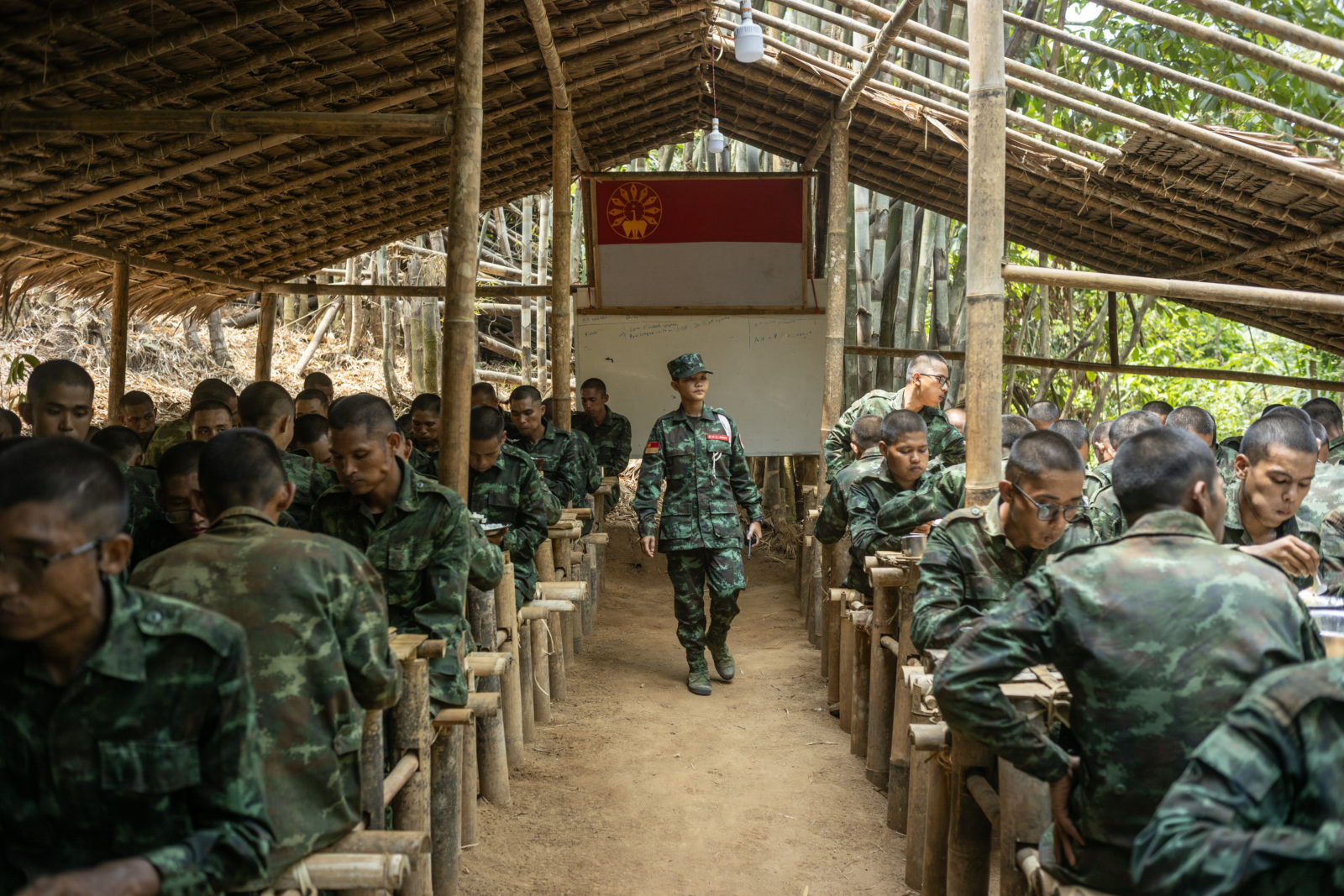
Newly recruited soldiers are seen during the lunch break at the B.P.L.A’s training camp. Photo: Ta Mwe
The poet has other things on his mind. Tonight, he is receiving Sayar John, an important guest. His scraggly beard, bony chest and necklaces down to his navel make him look like a castaway. The jungle is not his natural environment. Sayar John has just arrived from Rangoon, where he heads a so-called “urban guerrilla unit,” which assassinates soldiers, civil servants, businessmen close to the junta and suspected informers in the name of the resistance. The headquarters is a hive of activity. People drink warm beer, smoke, have fun. Sayar John has made the long journey from the economic capital to obtain weapons.
Assassinations are a controversial practice within the resistance. “There is collateral damage,” admits Maung Saungkha. The mother of one of his friends was killed by a commando. She was walking in the arms of her brother, a retired soldier; the gunmen mistook her for his wife. A dark night envelops the camp. Drinks are brought in by torchlight. Suddenly, the whole table stands up as one, gazing up at the stars. Who heard it first? A junta plane flies overhead. A Chinese Harbin Y-12, designed for transport, but hijacked to kill. “They’re dropping bombs by the door”, Saungkha warns me. An attentive silence settles in. From the ground, the lethal device looks like a toy.
The dinner was a success for Sayar John, who left with a Panzer pump-action shotgun, “very effective at close range,” and 257 rounds of ammunition. The poet did not want him to pay. “Is it a gift?” I ask. “More like an investment,” replies the commander. “You never know when you’ll need help.”
The next day, Maung Saungkha wakes me up at 4am. As I am leaving the camp, he has an idea. He leans over to the driver: “Go through Hpapun. Show him victory.” A few hours later, the town conquered by the resistance a month ago appears at the end of a bridge covered in rubble. In the deserted streets, the driver speeds up, forehead pressed against the windscreen, one eye on the sky and its deadly planes. With the engine off, you could hear the birds, if they had the heart to sing. The junta was relentless, bombing shops, gardens and large houses reduced to concrete confetti. I see an ambulance with broken windows. A child’s bicycle lying on the pavement. The poet spoke of victory, but only fear inhabits this damned city. The new Burma is growing on ruins. The junta will never let go of the country’s reins without destroying it.
Further Credits: “I would like to credit Burmese photographer Ta Mwe. He works under a pseudonym because of the safety issues for Burmese reporters in Myanmar and Thailand. I submitted his name to XXI because I really like to work with Burmese photographers. He took fantastic pictures but suddenly, he also had to do more : our fixer/translator didn’t feel well and left us after a few days. He stepped in and translated conversations for me.”





